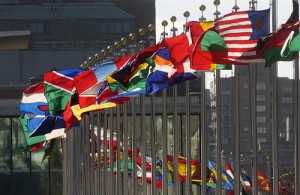 I was grateful to participate today in a conference that took place at Europe House on the topic of Digital Diplomacy – discussing how information from social media sources is gathered, verified and used; who are the main actors in the UK and abroad; and what will the future of digital diplomacy (or eDiplomacy as some like to call it) and foreign service look like over the next few decades.
I was grateful to participate today in a conference that took place at Europe House on the topic of Digital Diplomacy – discussing how information from social media sources is gathered, verified and used; who are the main actors in the UK and abroad; and what will the future of digital diplomacy (or eDiplomacy as some like to call it) and foreign service look like over the next few decades.
Fascinating topic with a room full of diplomats, academics, journalists and social media pioneers adding to the lengthy discussion over multiple sessions (check out #londonthink for a running commentary).
I don’t want to cover too much of the event itself, and you can read an overview here (also some good case studies were used: Storyful, E-Diplomacy Hub, Twiplomacy and Electionista), but rather I wanted to put together a number of thoughts that were raised for me throughout the day.
First of all, it was very encouraging to see the level of priority with which this topic was given by all those involved (even if the focus was far too weighted towards Twitter). The idea that we are seeing a fundamental shift in the way relationships are formed and dialogues are conducted in the public sphere was inherent in all the sessions – and a true sense of the gravity of what this means for diplomacy and political engagement with citizens was expressed with an overall positive attitude towards a more open and communicative form of political reasoning.
However, out of all of this excellent and vibrant discussion I did feel that there were a few holes worth mentioning. Many of these issues come from an understandable desire to think positively and to highlight proactive movements towards more genuine relationships between nations and their respective constituents – a desire that means the conversation didn’t steer into certain areas that might require a more critical or conscientious lens.
It took until the Q&A segment of the final session before the word ‘privacy’ was even uttered. This has a lot to do with the information being presumed to be in the public sphere (for example, when we tweet), and therefore welcome to be used for data mining purposes. In most cases this is true, but the boundaries between public and private in social media are not entirely clear – and indeed the definition of privacy is shifting because of how we use these new forms of communication.
 It will be vital over the coming decade to clarify where the ethical boundary exists between nation states collating important information (‘important’ defined as that which meets their needs) and the sanctity of personal privacy along with freedom of expression and association. When is it okay for a government to demand a private corporation such as Google, Facebook or Twitter hand over message logs or other non-public information? There are, of course, instances where this is necessary – criminal cases in particular – but there are also already moves to breaching these digital privacy boundaries for the sake of ‘national interests’.
It will be vital over the coming decade to clarify where the ethical boundary exists between nation states collating important information (‘important’ defined as that which meets their needs) and the sanctity of personal privacy along with freedom of expression and association. When is it okay for a government to demand a private corporation such as Google, Facebook or Twitter hand over message logs or other non-public information? There are, of course, instances where this is necessary – criminal cases in particular – but there are also already moves to breaching these digital privacy boundaries for the sake of ‘national interests’.
This is taken even further when we consider that one can be found guilty by association, and extensive intelligence efforts have been conducted on those who operate in the spheres of political activism and/or subversion of various kinds simply through the networks they might have contact with. When does the monitoring of situations become excessive surveillance of civilian populations? Who should be accountable if the public feel a line has been crossed, and how can action be taken?
The second ethical point that emerged is one which can make it difficult to swallow the ‘open and friendly’ approach to engagement: which is the duplicity that we regularly see evidence of from political powers in the online sphere. It’s encouraging to hear that foreign offices are moving towards more open forms of communication – more humanised relationships with the general public – but this lacks a certain reality because it ignores the documented fact that governments around the world are simultaneously moving towards limiting the true ‘freedom’ of internet communications (SOPA, PIPA, ACTA and on…); hoarding and mining data on unprecedented levels in a legally ambiguous manner; utilising social media platforms to disseminate propaganda and collect intelligence through fake accounts; and action that subverts the sovereignty of other nations and transcends established jurisdiction. All of this before we even include any mention of cyber-warfare conflicts that are currently active between the world’s largest and most prominent nations.
But for this post to focus solely on negative critiques would be disingenuous in its own right, because the sessions were filled with speakers genuinely concerned with how social media can be used to empower citizens and also to provide an accurate understanding of what is occurring on the ground in areas that might otherwise be inaccessible. There was also an overall sense of experimentation, and it is encouraging to see a move away from risk-averse public relations strategies to those that have more tolerance for missteps in order to increase overall engagement.
For me possibly the most insightful comment came right at the end, where it was predicted that over the coming decades we will see a shift towards a more nuanced understanding of the nature of speech online. Whereas today every tweet put out is considered your own personal gospel, there is a need to see these forms of communications as more ‘in-the-moment’ and reactionary. They are immediate responses to events, not necessarily well considered and crafted contemplative pieces (some might say this should even extend to blog posts!). As such, they should be fallible and we should see them as a far more transitory and loose form of dialogue than many of us currently allows them to be.
 At the core of a lot of this is, I feel, a disconnection between communications technology platforms and the empathic, emotional depth of our everyday interactions. Nobody can now doubt that a company such as Google has completely changed the world (ask the question 10 years ago and there were many who would!), but they, and others, have done so at a speed of transformation that has left behind the subtlety of human interaction often in favour of a utilitarian approach to data and software engineering.
At the core of a lot of this is, I feel, a disconnection between communications technology platforms and the empathic, emotional depth of our everyday interactions. Nobody can now doubt that a company such as Google has completely changed the world (ask the question 10 years ago and there were many who would!), but they, and others, have done so at a speed of transformation that has left behind the subtlety of human interaction often in favour of a utilitarian approach to data and software engineering.
The groundswell of public sentiment around privacy concerns; callous and widespread displays of cyber-bullying; internet and social media addiction; and even an issue as simple as how we interpret or misinterpret a few x’s or 😉 in our messages all point to a gap between our technological evolution and our emotional intelligence. This gap is already closing, and incredibly quickly considering how new this information revolution is, but it should be seen as a primary challenge for how we envisage technology platforms in the future – not only in how they are created, but in how they are ultimately used.
Diplomacy is an area seeing rapid change during this digital age simply because everything around us is facing the same challenges. Identity formation is taking a far more conscious role in our lives; digital footprints can have both positive and negative ramifications; Information delivery and consumption is being revolutionised on an almost annual basis; and our capacity to relate to one another across the entire global community is at an unprecedented level. To say this shift is transformative is to both state the obvious but also to not go far enough. Those who feel the impact of this new era is obvious are also the very same people (myself included) who are under-estimating just how incredible the change is going to be.
Where we end up is impossible to predict, but what we can be sure of is that we need to be flexible and dynamic in order to respond in a manner that promotes authentic dialogue over oppressive agendas. The scary part is that with the tools currently here and on the horizon, either of those options good or bad are entirely possible outcomes.
A lot depends on the actions of those producing products, formulating policy, mobilising collective action, and even how we personally act and engage with those around us. Will we see commitment towards a form of honest and authentic communication that lies at the core of how we envisage and put into practice our political, corporate and social structures? If so, the future might just be very bright indeed.




